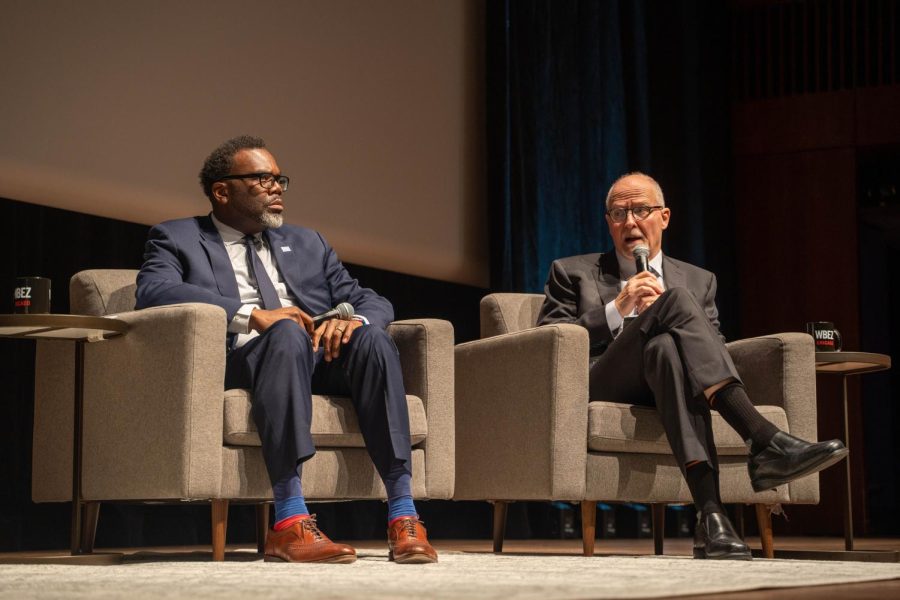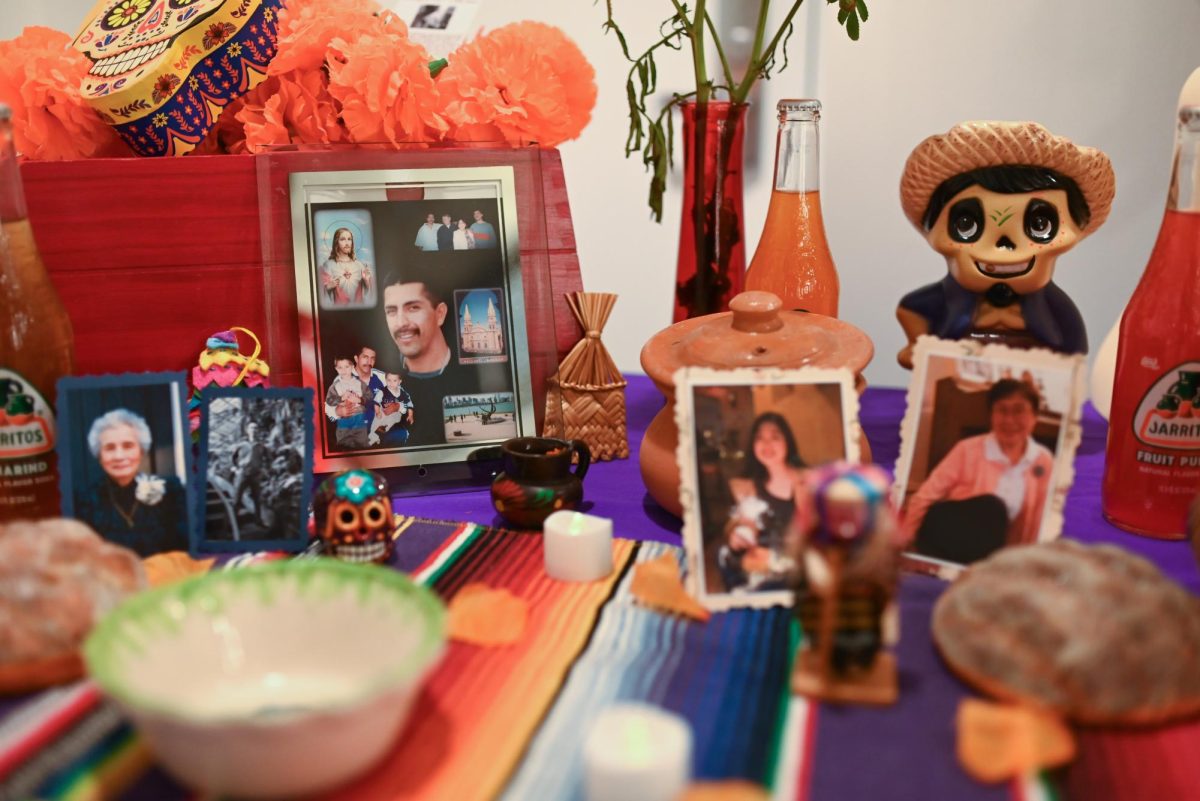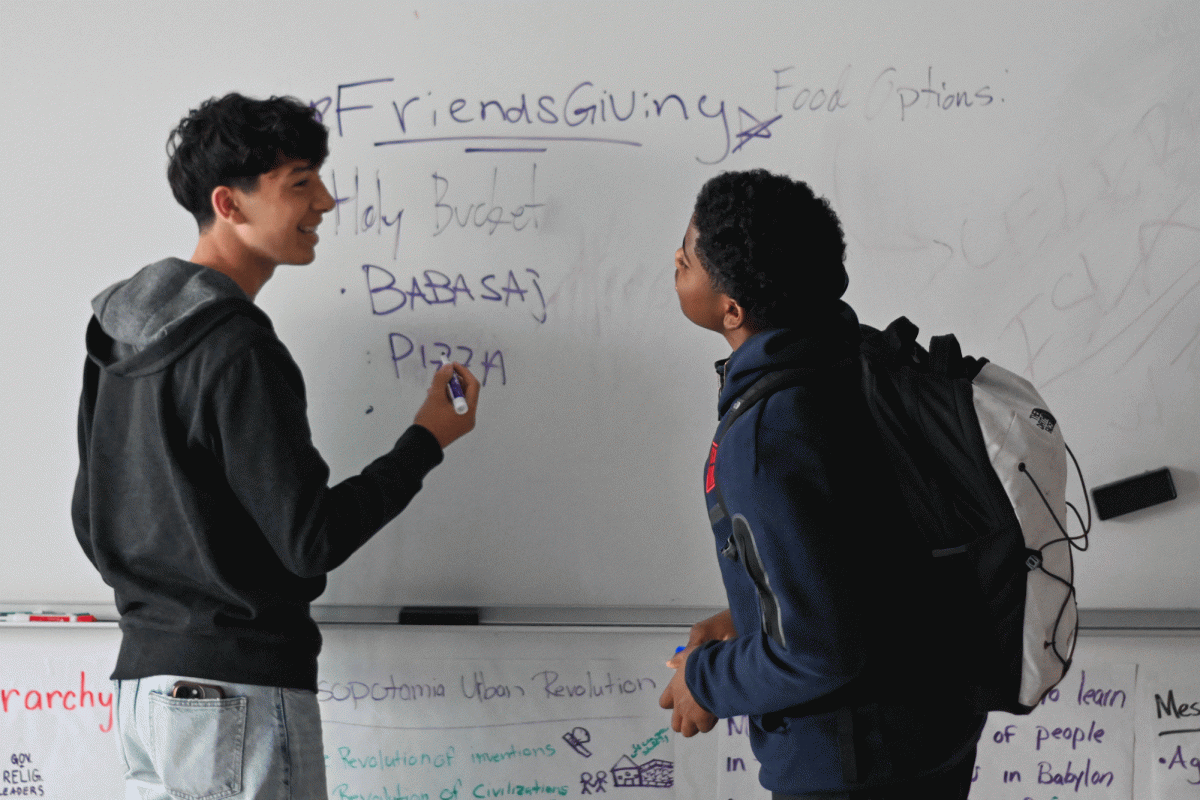Mayoral election: candidates show a sharp contrast
Brandon Johnson and Paul Vallas participate in a debate hosted at the University of Chicago on March 30.
March 31, 2023
Overview: After no candidate received 50% of the vote in the Feb. 28 municipal election, the two top candidates, Cook County Commissioner Brandon Johnson and former Chicago Public Schools CEO Paul Vallas advanced to the April 4 runoff, setting the stage for the two, and their vastly different policies, to face off to replace incumbent Mayor Lori Lightfoot, who finished third.
In the primaries, Mr. Vallas gained 33.2% of the vote, countered by Mr. Johnson’s 21.1%. While both candidates in the officially nonpartisan race are affiliated with the Democratic party, Mr. Vallas has dodged questions over his conservative views, and their policies and campaign focuses greatly differ.
Mr. Vallas, who unsuccessfully ran for mayor in 2019, served as CPS CEO and the city’s budget director. His campaign revolves around three main issues: public safety, education and funding. His campaign emphasizes a tough-on-crime message, citing a goal to take the “handcuffs” off of the police. He wants to address the issue of CPS funding and the city’s economic development, which he hopes to grow by investing in communities from an asset-based approach.
Mr. Johnson’s campaign message centers around progressive ideas for the city that cover Mr. Vallas’ concerns as well as topics such as environmentalism, LGBTQ rights and immigration. Before becoming an organizer for the Chicago Teachers Union and elected commissioner for the 1st District of Cook County, he worked as a public school teacher on the Near North and West sides of the city. Mr. Johnson’s goals consist of investing $1 billion in city finances and in the school system, from pre-kindergarten to CPS teachers. Mr. Johnson also calls for extensive police department reforms and opening of mental health assistance centers in the city.
Policy positions: Both candidates cite their experience with CPS as driving forces for their planned education reforms.They share a goal of reinstating schools as community centers by implementing year-round youth-oriented programs, but they diverge from there.
Mr. Johnson calls for holistic expansion of the education system, from pre-kindergarten to city college, by providing direct investments into schools at each level of the education system. He calls for support for immigrants, refugees, bilingual parents, students and teachers. Mr. Johnson proposes shifting from the student-based budgeting model, which he believes disadvantages communities making them strip their resources, to one where CPS can receive adequate state funding. He also proposes ideas like universal child care, paid for with the money provided if “corporations paid what they owed in taxes.”
A charter schools advocate, Mr. Vallas focuses on safety and funds, so that “money follows the kids into the classroom,” allowing citizens to “empower and trust local communities to know what’s best to do with your money for your children.” Vallas would like to keep schools open for weekends, holidays and after school by bringing in community and religious groups. He would like to dismantle central education administration and shift the power to elected Local School Councils. Like Mr. Johnson, he calls for early intervention and identification of children at high risk.
Mr. Johnson’s plans are contained in his Better Chicago Agenda, which aims to make $1 billion in investments for the city without raising property taxes. His Bring Home Chicago ordinance would impose a one-time tax onto home sales over $1 million, providing funds to address the housing crisis.
Mr. Vallas’ plans include creating an Independent Community Development Authority, a Fair Share Investment Trust for second and third generations, and a strategy to claim empty properties on the West and South sides by using property tax, local and state incentives.
When addressing public safety, Mr. Johnson’s police reforms include a violence intervention, an efficiency audit, 200 new detectives and a streamlining of positions to maximize efficiency. He also plans to institute youth-led restorative justice groups and a trauma response network for mental health support and victims of gun violence and domestic abuse. His plans include addressing racial profiling by ending no-knock warrants and erasing the gang database. When addressing current CPD officers, Mr. Johnson plans to terminate officers associated with extremist political groups, such as Proud Boys and Oath Keepers. In the weeks before the runoff, Mr. Vallas claimed Mr. Johnson will defund the police, a statement Mr. Johnson has rebutted.
With his “tough on crime” message, Mr. Vallas wants to institute a community policing model, which he will initiate by hiring more officers and replacing the leadership team of former Superintendent David Brown. To maximize productivity and efficiency of officers, Mr. Vallas would like to eliminate redundant positions and end overtime initiatives. He would also like to encourage community-based agency leaders to take action against street violence.
Campaign: Mr. Vallas raised $6.3 million, over $100,000 from himself, which removed the cap on contribution limits. A majority of his donations were personal contributions from the executives of private equity firms. Mr. Johnson, who raised $4.2 million, was primarily funded by labor groups.
Chicago Sun-Times reporter Mitchell Armentrout said in an interview with the Midway that in the primary election, Mr. Vallas gained support from affluent areas in the far Southwest and Northwest sides of the city in neighborhoods such as Beverly, Jefferson Park, Lincoln Park and Old Town. Mr. Johnson received votes throughout the South and West sides and the north lakefront, which were highly sought areas in the primary. Leading up to the runoff, candidates spent time focusing on communities of color particularly on the South Side.
Mr. Armentrout noted it is difficult to determine the influence of endorsements. As the candidates spent time in districts where Ms. Lightfoot won the vote, it will be difficult given her lack of endorsement.
“I think Chuy García is a pretty significant endorsement for Brandon Johnson, because they were viewed as both very progressive Democrats, and in the first round of voting there was a lot of talk about them splitting that progressive vote,” Mr. Armentrout said. “As for Paul Vallas’ endorsements, you know, the week after the first round, he announced [former Illinois Secretary of State] Jesse White’s endorsement, and that’s got to be a big one since Jesse White is arguably one of the most popular politicians in Illinois in the last few generations.”
Mr. Armentrout believes the runoff will be an extremely close race, which will ultimately depend on voter turnout, especially different age groups.
“I think that there’s a pretty stark generational divide,” Mr. Armentrout said. “I think that sort of divide might play better in Paul Vallas’ favor only because older people tend to turn out to vote more. It’s harder to energize the youth vote, so I think that’s another focus for Brandon Johnson here in the homestretch.”












